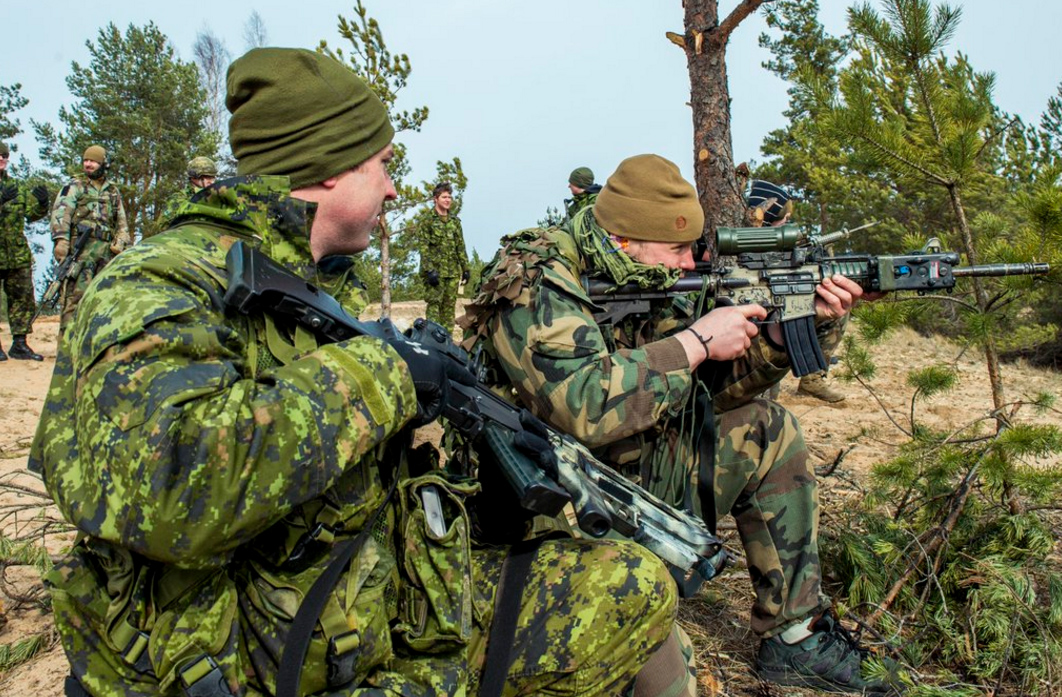
[iStock]
Overseas and in operations rooms back in Canada, they will be combatting Moscow’s efforts to win the hearts and minds of Latvians and incite growing dissent among the republic’s Russian-speaking minority.
The allied counter-efforts–including their own cyber-operations, an open-door media policy and more traditional intelligence functions–will be keys to the ultimate success of the Canadian-led NATO mission.
Russian propaganda efforts in Latvia are already underway, including efforts to make it appear that Latvia doesn’t want NATO troops on its soil, said Chief of the Defence Staff General Jonathan Vance following an appearance at the Conference of Defence Associations meeting in February.
“Planted stories will occur,” Vance predicted. “I think Russia will certainly see this [mission] as something to interfere with, so we will take all the precautions that we can.
“I think it’s important that you hear this from me: There will be a desire to skew way out of proportion and potentially provide falsehoods about what’s actually happening in Latvia with Canadian troops. We have to take on a strategic communications role so that truth prevails.”

Canadian soldiers joined more than 1,000 allied troops during NATO Exercise Summer Shield 2015 in Latvia. [Combat Camera]
Those states include Lithuania, Estonia and Poland and, along with Latvia, are all NATO members. The 4,000 NATO troops have been described as a measured response to 330,000 Russian troops believed to be amassed west of Moscow.
Russian President Vladimir Putin justified the March 2014 annexation of Crimea and support for secessionist rebels in Ukraine’s east as protecting Russians who found themselves living in a foreign country after the Soviet Union broke up in 1991.
Latvia and Estonia have considerably larger proportions of Russians and Russian-speakers than Ukraine, where 24 per cent of the population is Russian-speaking.
Latvia, for example, is 38 per cent Russian-speaking and Russians comprise the vast majority of the republic’s 280,000 non-citizens. As foreigners, they can’t vote or work in senior government positions.
Russia has been cultivating their discontent and touting its role as champion of the downtrodden in Latvia and elsewhere among the Baltic states. Moscow, however, denies having designs on the region and characterizes the NATO deployments as provocations.
Lithuania’s foreign minister described Russia’s strategy as “hybrid war” designed to destabilize the Baltic states through military movements, disinformation campaigns and cyber-operations, including full-blown cyber-attacks on companies, information websites and even military systems.
“We expect Russia to respond to this [deployment] as they have responded to any sort of deliberate, determined stance,” said Vance. “They’ve actively conducted strategic communications against NATO exercises.
“We’re aware of it. We’ll try to be as sophisticated as we can be. But, ultimately, what we do and what our allies do as part of that battle group in terms of its professionalism and what it provides in terms of a deterrent effect are the things that need to be measured.”
Vance said Putin should not be emboldened by the pro-Russian or NATO-critical comments coming out of Washington in recent months and he should not interpret them as signs that there are cracks or failing resolve within the alliance.
“I think that we have had it said and repeatedly said by many actors, including the [U.S.] secretary of defence and our minister, about the resolve of the United States as a member of the NATO alliance.”
Advertisement




















